Reading at Brookfield Junior Academy
Ofsted 2022
"Leaders ensure that every pupil learns to read well. Children in early years get off to a good start due to a well-planned phonics programme. Staff are quick to identify children who may be falling behind with reading and they make sure these pupils are supported to keep up. Pupils enjoy reading and talk about their favourite books with enthusiasm"
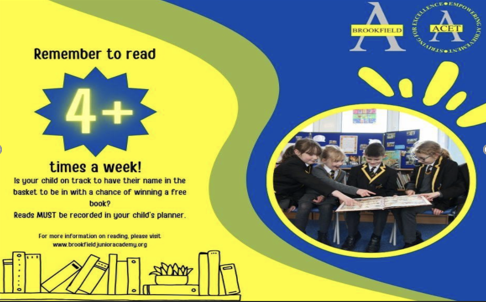
Reading is at the heart of the Brookfield Junior Academy curriculum and is also one of our key drivers. We aim for every child to become a fluent reader. From the start of their journey with us, pupils are supported to develop a love of reading. They are exposed to high-quality texts and through a systematic, synthetic approach to the teaching of phonics, they are provided with the skills they need to decode confidently.
We aim for all pupils at Brookfield Junior Academy and beyond to be avid readers, pupils who read fluently and widely and are able to express preferences and opinions about the texts that they read. We strive for them to read for pleasure, having had access to a wide range of text types, genres and authors in order for them to make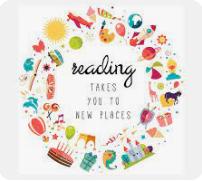 e informed opinions about their favourites.
e informed opinions about their favourites. 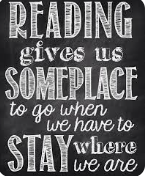
Early Reading
In the Early Years Foundation Stage, the ‘Communication and Language’ and ‘Literacy’ areas of learning support pupils in developing their reading skills. The FS2 curriculum and print rich learning environment ensure pupils have access to focussed, teacher led reading tasks as well as opportunities for child-initiated activities within continuous provision.
Thorough phonics assessments completed by Miss Crook (Our Phonics and Reading Lead) They enable a smooth transition from Foundation Stage into Key Stage One. Half termly assessment ensures pupils continue to make good progress. Lessons are planned to cover all objectives set out in the statutory English curriculum and develop pupils’ love of reading.
In daily reading sessions, children develop their key reading strategies and skills for decoding and comprehending in groups of a similar ability. This is to ensure pupils have the opportunity to read in groups with books accurately challenging for their word and comprehension level. Children also continue to develop their reading fluency skills, building upon their phonics knowledge and skills.
In whole class reading sessions, children continue to develop their strategies and skills for reading through a planned reading unit that works through three distinct phases:
Phase 1, gathering and building background knowledge and introduction to the text to gain a basic understanding.
Phase 2, digging deep and investigating the text to deepen knowledge and understanding.
Phase 3, applying knowledge and understanding within and across texts.
Key Stage 2
As our pupils move into Key Stage 2, reading for meaning is embedded across the curriculum and is supplemented by daily focused reading sessions which take place every morning. During this session all pupils will have the opportunity to read aloud every day. Pupils will get the opportunity to discuss texts orally and have class discussions and debates.
We recognise the importance of fluency to ensure working memory is freed up. This enables children to comprehend progressively more complex texts. Careful consideration is given to teaching the morphology of words, including the meaning of roots, prefixes and suffixes.
Age appropriate texts are carefully chosen from recommended reading lists for each year group. The level of challenge is progressive and covers a wide range genre to promote an appreciation of text structure, equality and diversity.
Reading sessions are planned to maintain a love for reading and develop skills as outlined in the National Curriculum:
- Vocabulary
- Fluency
- Summarising
- Inference
- Predication
- Explain
- Retrieval
We plan from our reading progression documents (See below Y1-Y6) These support Teachers in ensuring that our Reading sessions are progressive year on year.
Texts and visual literacy is carefully chosen by Teachers to meet the needs of all learners and engage children.
Children will have the opportunity for discussion in all reading lessons and engage with Visual Literacy. Children will have the opportunity to read out loud and or discuss texts every day!
Below is the reading sequence.
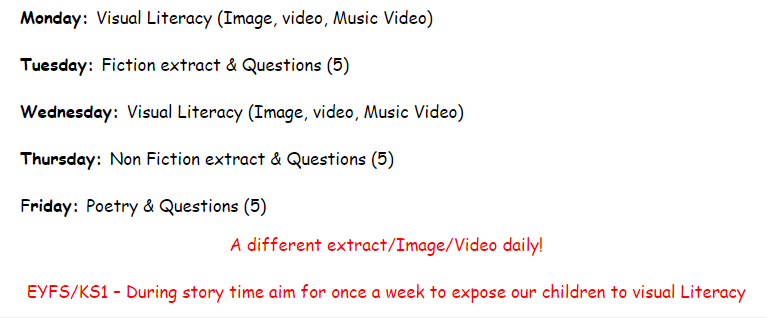
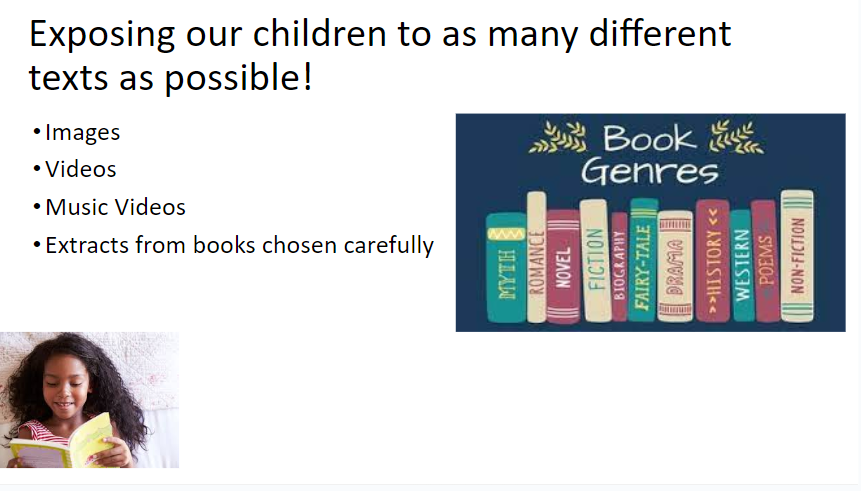
Home School Reading
Home school links are very important in reading. When teachers and support staff listen to pupils read, this is recorded in their planners. We encourage parents/carers to listen to their child read regularly at home. We aim for every child to read at least 4 times a week at home. This will be acknowledged by Teachers on a weekly basis.
Each week each child will take home –
- One reading book from the book band to read to their parents/ carers.
- One ‘reading for pleasure’ book for their parents/ carers to read to/with them to develop a love of reading
Reading Awards
Each half term your child will receive a reading award if they read 4+ times or more a week at home. Reading incentives are also given out on a weekly basis in Class and from Miss Crook our reading lead. So far we have given out swimming passes, play passes and Experience days at Hooton Lodge.
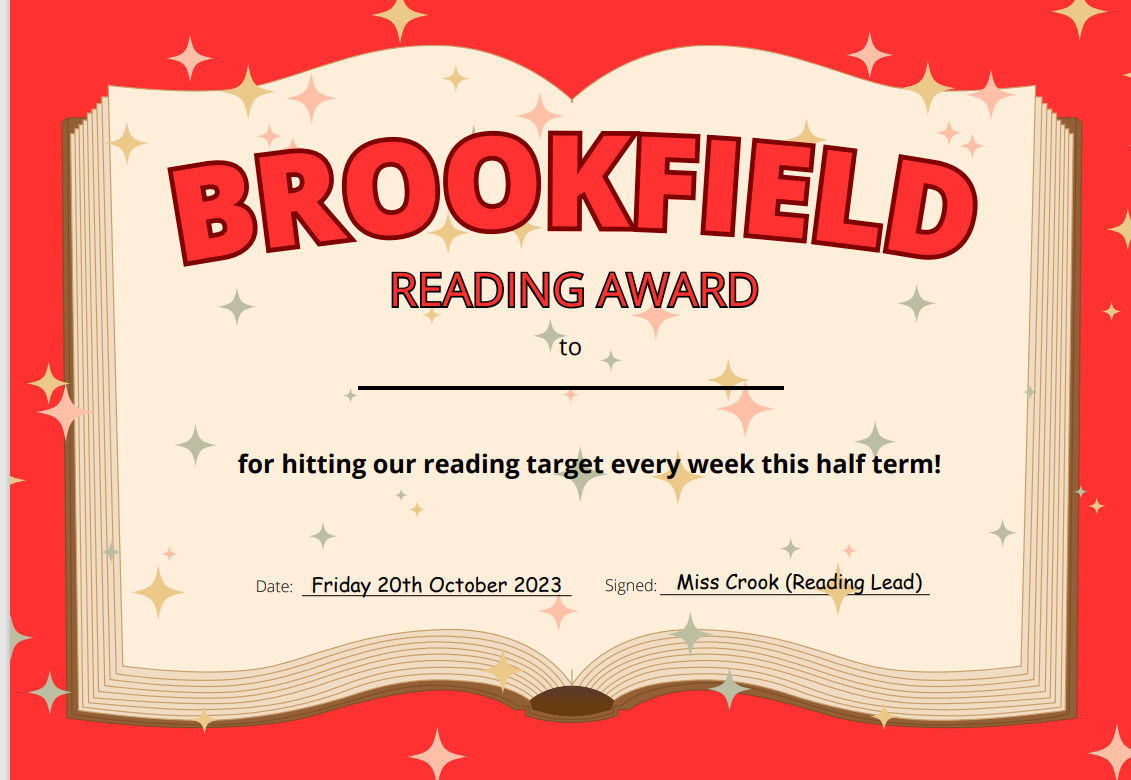
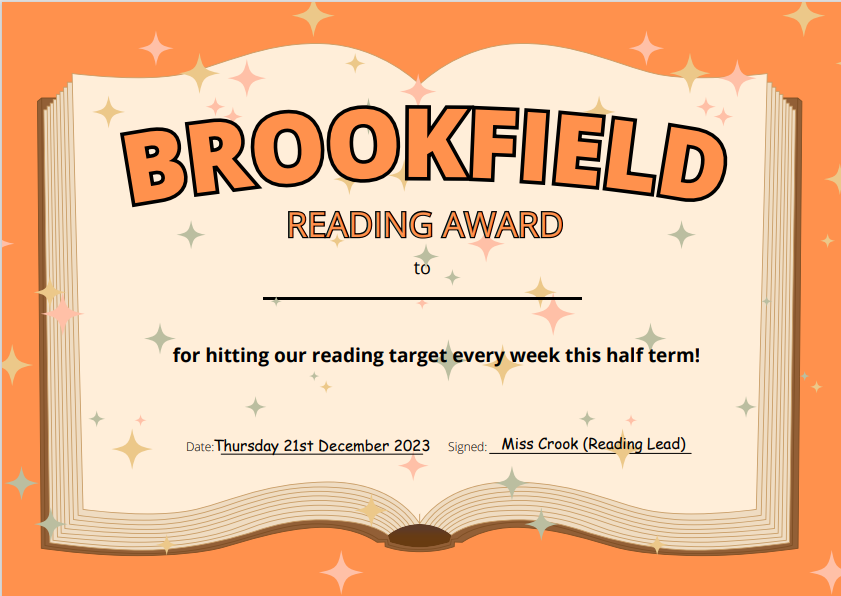
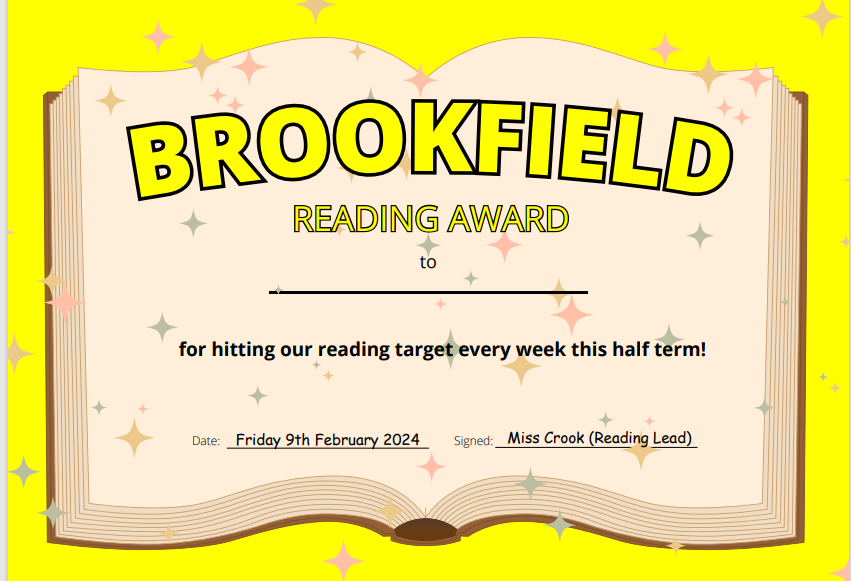
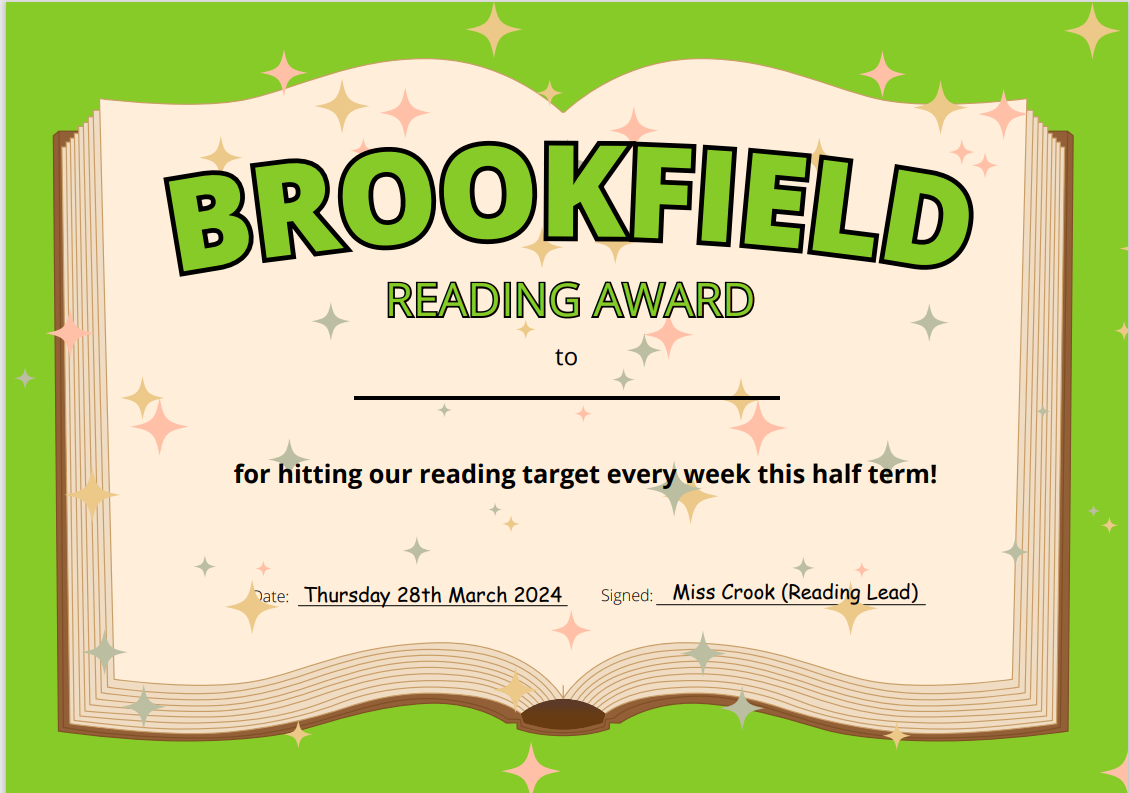
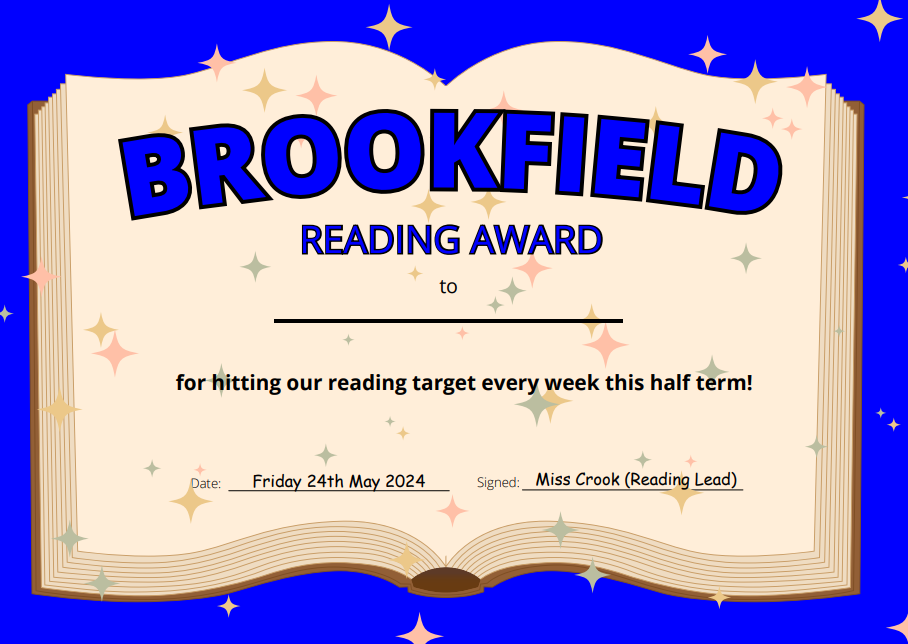
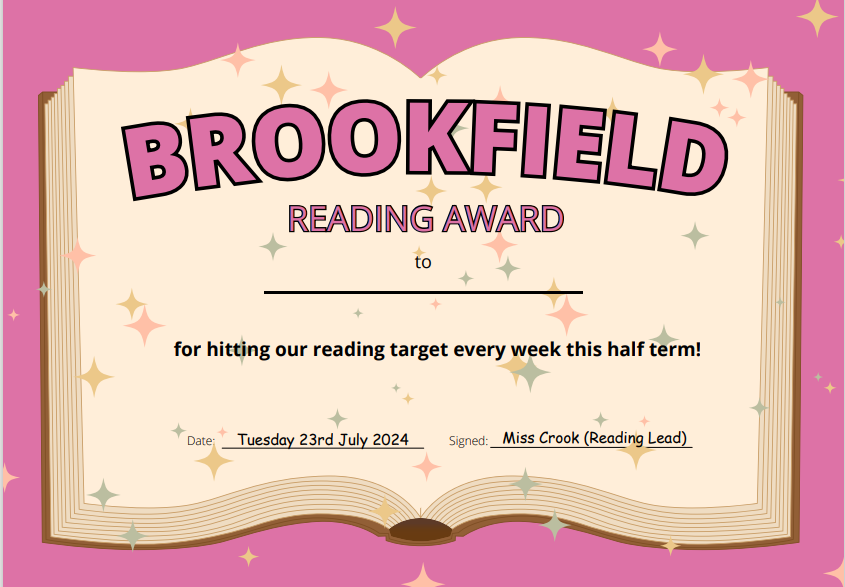
Our Libraries at Brookfield Junior Academy
At Brookfield Junior Academy, we are extremely lucky to have a wonderful library area in each key stage filled with high quality texts that children are able to enjoy. Children visit the library to choose a book that they can enjoy reading both at home and at school. We allow the children to have free choice when picking a library book, therefore, the books that children choose may not always reflect their reading ability. We would suggest that library books are to read and enjoy together.
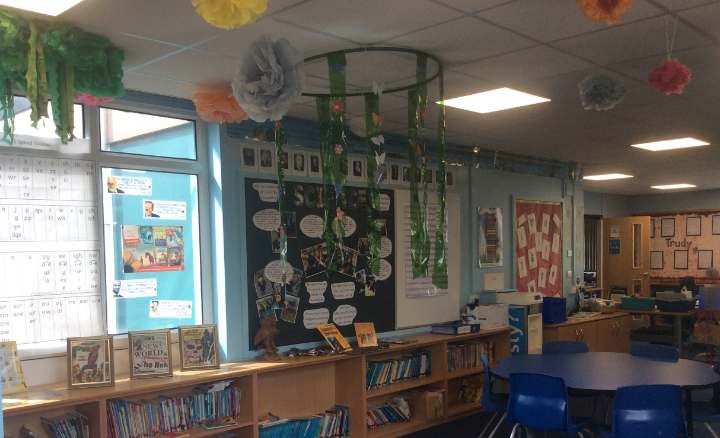
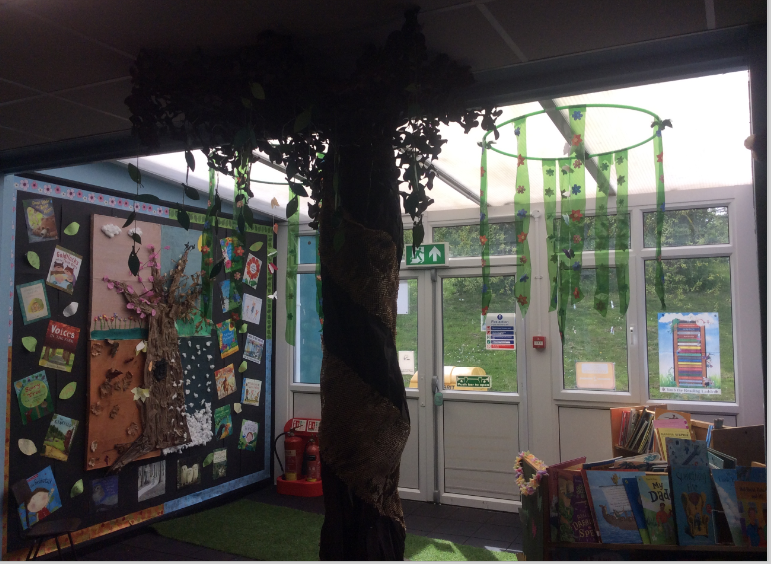
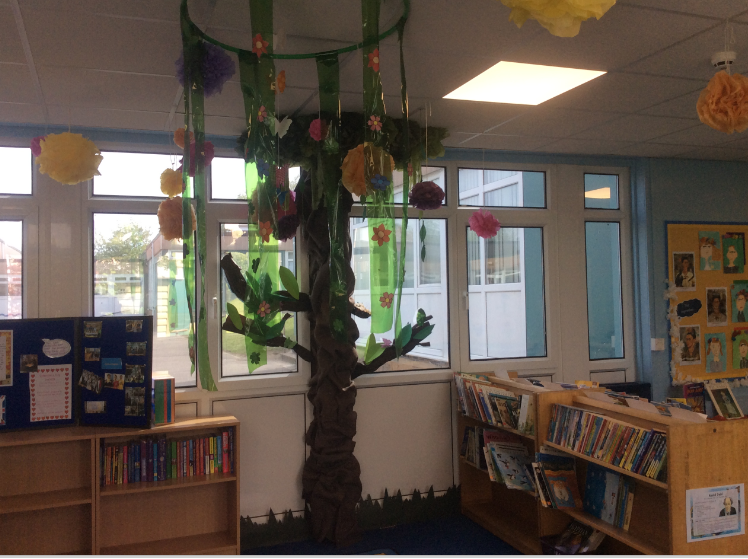
Reading for pleasure
At our school we want our children to love reading, therefore our class teachers choose exciting and engaging texts for their learning that will excite the children.
Each classroom has an inviting reading corner, where children are able to spend time reading, choosing books and sharing the texts that they have enjoyed. The bookshelves in each classroom are filled with up-to-date, age-appropriate and engaging texts that cater to the children’s wide range of interests.
Children will also be able to take home of of these books on a weekly basis to read and share with you at home.
10 Tips on Hearing Your Child Read As parents
You are your child's most influential teacher with an important part to play in helping your child to learn to read. Here are some suggestions on how you can help to make this a positive experience.
1. Choose a quiet time Set aside a quiet time with no distractions. Ten to fifteen minutes is usually long enough.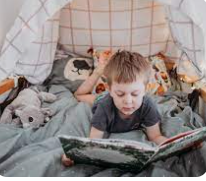
2. Make reading enjoyable Make reading an enjoyable experience. Sit with your child. Try not to pressurise if he or she is reluctant. If your child loses interest then do something else.
3. Maintain the flow If your child mispronounces a word, do not interrupt immediately. Instead, allow opportunity for selfcorrection. It is better to tell a child some unknown words to maintain the flow rather than insisting on trying to build them all up from the sounds of the letters. If your child does try to 'sound out' words, encourage the use of letter sounds - Remember to use FRED TALK! 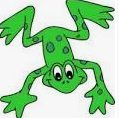
4. Be positive If your child says something nearly right to start with that is fine. Don't say 'No. That's wrong,' but 'Let's read it together' and point to the words as you say them. Boost your child's confidence with constant praise for even the smallest achievement.
5. Success is the key Parents anxious for a child to progress can mistakenly give a child a book that is too difficult. This can have the opposite effect to the one they are wanting. Remember 'Nothing succeeds like success'. Until your child has built up his or her confidence, it is better to keep to easier books. Struggling with a book with many unknown words is pointless. Flow is lost, text cannot be understood and children can easily become reluctant readers.
6. Visit the Library Encourage your child to use the public library regularly. (Swinton are looking forward to welcoming you all)
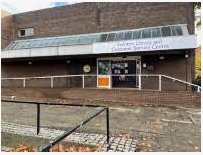
7. Regular practice Try to read with your child on most school days. 'Little and often' is best.
8. Communicate Your child will bring a reading diary from school. Try to communicate regularly with positive comments and any concerns. Your child will then know that you are interested in their progress and that you value reading.
9. Talk about the books There is more to being a good reader than just being able to read the words accurately. Just as important is being able to understand what has been read. Always talk to your child about the book; about the pictures, the characters, how they think the story will end, their favourite part. You will then be able to see how well they have understood and you will help them to develop good comprehension skills.
10. Variety is important Remember children need to experience a variety of reading materials eg. picture books, hard backs, comics, magazines, poems, and information books.
Mystery Reader
In Foundation Stage & Key stage 1 you will have the opportunity to participate in ‘Mystery Readers’. In Key stage 2 we will be inviting members of the community and other staff in school to share stories.
On specific days we will invite parents, grandparents, siblings, aunties, uncles etc. to bring in and read their favourite book to a class. Children love when their family members are the ‘Mystery Reader’ and all children benefit from an adult sharing their love of reading.
Because this is a mystery, all information must be kept TOP SECRET from your child, including the date you are coming and the book you will be reading. A week before you are scheduled to come in, you will be sent home a letter asking for five clues about yourself. These clues will be read to the class before your arrival to build suspense and keep the children guessing about who our mystery reader will be!
Your child’s teacher will have the Mystery Reader sign-up sheet in a morning with available dates. Please speak to your child’s class Teacher if you would like to sign up.
Family Reading Mornings
On the last Friday of every month we invite you in from 8:35am to share books with your child. This is from FS1 to Y6.
Swinton Library Links
We are currently making links with our local library. Each class will visit the library at least once in the academic year. The library service will deliver sessions to our pupils and hear individual children read in school. Workshops have been booked over the academic year each each key stage.
Watch this space ... much more to come!
Boggledy Books
We have Boggledy Books visit us every term. All children and parents are welcome to view and buy the books. All books at £1 £2 & £3 and for every 5 books bought school will get a free book for school.
This year the dates are:
November 9th 2023
March 21st 2024
July 4th 2024
Recommended Books to Read
Books to Promote Diversity
Please see a video recorded on the 17th February around Reading fluency and comprhension. This is to support you at home.
Click here to see Miss Crook presenting her parent workshop
If you have any questions regarding our Reading Curriculum please contact Miss Crook Our Phonics and Reading Lead. lisa.crook@brookfieldjunioracademy.org